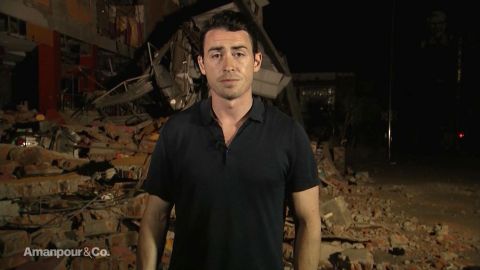Read Transcript EXPAND
CHRISTIANE AMANPOUR: Oh, man. It’s so sad and so reminiscent of the tsunami that I covered back in 2005, that wave that we saw, those little kids who were separated from their parents and so many people dead and the bodied mounting. So, to answer you own question, what does a small town do at this precise moment? What is the government doing?
MATT RIVERS: Well, you know, there’s a lot of criticism right now of the government, both locally and at the national level, Christiane, for lack of response, a slow response. We spent the whole day today walking through different homeless camps, basically, places that people have gone and there is a lack of electricity, a lack of water, food, health care, hygiene and everyone keeps saying, “Where is the government? I can’t even get fuel to run my generator.” And, you know, you feel for them because we’ve been here for a couple days and there isn’t a heavy government presence. We don’t know where the government is. The military can and should be doing more and it doesn’t appear that they are. So, you understand this frustration. So, to answer the question, it — what should they be doing? They should be everywhere giving aid. What are they doing? Well, they’ve been very slow to respond. And this is a country that has dealt with this kind of issue before, Christiane, as you know from your own reporting. And yet, as of now, it doesn’t seem like they’re learning the lessons of the past.
AMANPOUR: So, just to be clear. Often in these humanitarian disaster areas, natural disaster areas, you see planeloads of help, landing at whatever airstrip they can, helicopters, airdrop, this and that. Is there a problem with the airport? Why is it that the government or aid countries unable to land?
RIVERS: Well, there was a problem with the airport at first. There was a big crack in the runway and that was a big issue. But thatw as one of the first things that they repaired. And so, there isn’t a problem with the airport anymore. Now, granted the aircraft, air traffic control tower was damaged, but planes can still be landing here. So, why they’re not landing with more frequency, why more international health hasn’t been accepted by the Indonesian government, we’re just not sure. There’s rumors at this point that the president is going to make another appearance here. We can’t confirm that at this point. But there’s rumors that he’s going to be here and try and show that the government is on top of things. But that’s the question that people are asking here that we don’t have a ready answer to is where is the massive government response, the call for international aid and the reception of international aid? And we don’t know the answer as to why they’re not here.
AMANPOUR: Well, of course people are going to to ask, if the president can land why can’t aid land as well? But obviously key in these kinds of situations is clean water. You basically can’t survive without clean water. As you know, you can survive for days, potentially, without food. But we’re being told that there’s almost no water trucks and the Red Cross is saying it might take another several days before they can get enough water trucks and it’s already been three-plus days in this situation.
RIVERS: Yes. And that’s exactly what we’re hearing on the ground.
About This Episode EXPAND
Christiane Amanpour speaks with CNN Correspondent Matt Rivers; author Rebecca Traister; and Colombian President Ivan Duque. Walter Isaacson interviews Dean Baquet, Executive Editor of The New York Times.
LEARN MORE



